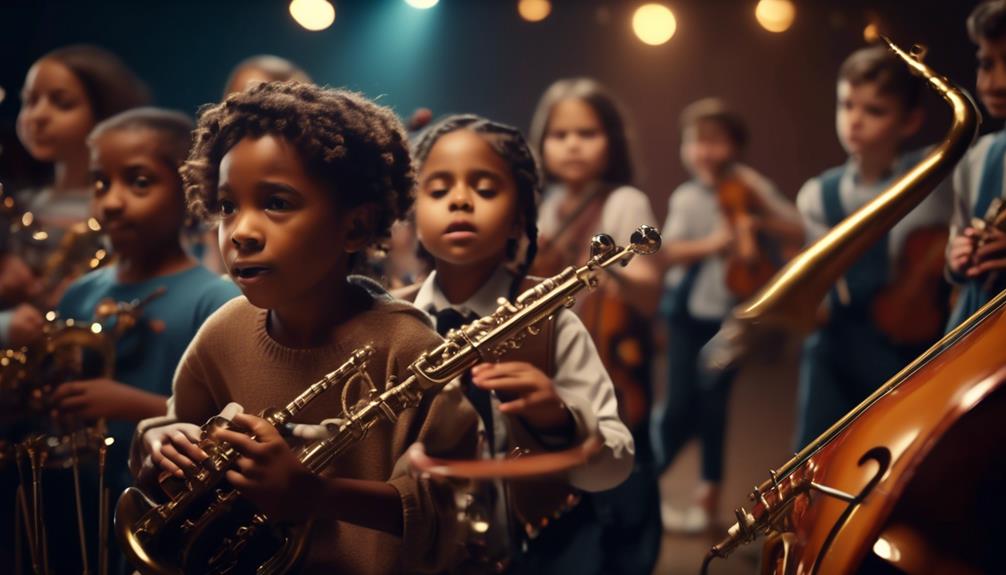How to Recognize and Nurture Musical Talents

The secrets to recognizing and nurturing musical talents are unveiled. This provides insight into identifying and developing natural gifts for music. It also inspires individuals to uncover hidden melodies within themselves and others.
Key Takeaways
- Signs of musicality, such as a natural sense of rhythm and a keen interest in music, can indicate early musical talent.
- Exceptional auditory skills, a strong inclination towards music, and quick memorization of songs are early signs of musical talent.
- Creating a nurturing environment that encourages exploration and practice is crucial for nurturing and developing musical talent.
- Access to high-quality music education, including formal instruction, exposure to live performances, and access to musical instruments and resources, is essential for supporting musical growth.
Understanding Musical Aptitude
If you're looking to understand musical aptitude, you've come to the right place. Developing skills and unlocking musical potential requires a deep understanding of what musical aptitude entails. It goes beyond simply being able to play an instrument or sing in tune. Musical aptitude encompasses a range of abilities, including rhythm, pitch perception, and the ability to recognize patterns in music.
To develop these skills, it's important to provide a nurturing environment that encourages exploration and practice. Children with musical potential can benefit from exposure to various musical genres and instruments. Encourage them to experiment and find their own musical voice.
As a caregiver or teacher, it's crucial to recognize and support musical aptitude in children. Keep an eye out for signs of musicality, such as a natural sense of rhythm or a keen interest in music. Provide opportunities for them to engage in musical activities, such as joining a choir or taking instrumental lessons.
Identifying Early Signs of Musical Talent
Identifying early signs of musical talent is crucial for nurturing and developing a child's potential in the field of music. By recognizing these signs early on, parents and educators can provide the necessary support and guidance to help children reach their full musical potential. But how can you spot these early signs? Here are some indicators to look out for:
| Early Signs of Musical Talent |
|---|
| 1. Exceptional auditory skills |
| 2. Natural sense of rhythm |
| 3. A strong inclination towards music |
| 4. Ability to memorize songs quickly |
| 5. Musical sensitivity and emotional expression |
Early musical prodigies often display these signs from a young age. They possess an innate ability to pick up melodies, harmonies, and rhythms effortlessly. Their exceptional auditory skills enable them to accurately reproduce sounds and tones. Additionally, their natural sense of rhythm allows them to feel the beat and move in sync with the music.
While genetics play a role in musical talent, it is important to remember that talent alone is not enough. Nurturing and developing this talent requires a supportive environment and proper training. By recognizing and fostering these early signs, parents and educators can provide the necessary resources, such as music lessons and exposure to various musical genres, to help children blossom into skilled musicians.
Identifying early signs of musical talent is just the first step towards nurturing a child's potential in music. With the right support and guidance, these young musicians can thrive and make beautiful music that will inspire and captivate audiences for years to come.
Nurturing a Love for Music
To nurture a love for music, immerse yourself in its enchanting melodies and let the rhythm guide your soul. Developing a passion for music requires dedication and involvement, especially from parents. Here are some ways you can foster a deep love for music in yourself or your children:
- Expose yourself to a variety of genres: From classical to jazz, rock to hip-hop, explore different styles to discover what resonates with you. Attend concerts, listen to albums, and explore the vast world of music.
- Encourage active participation: Sing along to your favorite songs, play an instrument, or join a choir or band. Actively engaging with music allows you to fully appreciate its beauty and express yourself creatively.
- Create a musical environment: Fill your home with music by playing it regularly. Whether it's during meal times or while doing chores, let music become an integral part of your daily life. This constant exposure will foster a deep connection and appreciation for the art.
- Provide opportunities for musical education: Enroll in music lessons or classes to develop your skills and understanding. Learning from experienced teachers will enhance your musical abilities and ignite a lifelong love for music.
- Support and encourage exploration: Allow yourself or your children to explore different instruments, genres, and styles. Provide resources and opportunities for musical growth, such as attending workshops, joining ensembles, or participating in competitions.
Providing Access to Musical Education
Are you ready to unlock the doors to a world of musical education?
Music education opportunities are the keys that will open up a whole new realm of possibilities for you. By providing access to musical education, you won't only enhance your talent development but also support your musical growth in ways you never thought possible.
Music Education Opportunities
Imagine a world where every aspiring musician, regardless of their background or circumstances, has the opportunity to unlock their full musical potential. In this utopia, music education programs abound, providing comprehensive and accessible resources for learners of all ages.
Here's what this world would look like:
- Music Education Programs:
- Community-based initiatives offer free or low-cost music lessons to underserved populations, ensuring that financial barriers don't hinder talent development.
- Schools prioritize music education, offering a diverse range of programs that cater to different interests and skill levels.
- Scholarships and Grants:
- Generous scholarships and grants are readily available to talented individuals who lack the financial means to pursue formal music education.
- Organizations and foundations offer funding to support aspiring musicians in their pursuit of excellence.
In this ideal world, aspiring musicians are no longer limited by financial constraints. They've access to a plethora of music education opportunities, empowering them to cultivate their talents and enrich the world with their artistry.
Enhancing Talent Development
Access to high-quality music education is key to enhancing talent development and allowing aspiring musicians to reach their full potential. Talent recognition is crucial in identifying individuals with innate musical abilities, but talent cultivation is equally important in nurturing and honing those skills. Providing access to musical education is a vital step in this process.
By offering opportunities for formal instruction, such as lessons or classes, aspiring musicians can learn the fundamentals, explore different genres, and develop their technical and creative abilities. Access to musical education also includes exposure to live performances, masterclasses, and workshops, which can inspire and motivate young musicians to expand their horizons.
Additionally, access to musical instruments, resources, and supportive communities further enhances talent development. By investing in high-quality music education, we can create an environment where aspiring musicians can thrive and fulfill their musical aspirations.
Supporting Musical Growth
To support the musical growth of aspiring musicians, providing easy access to high-quality music education is essential. Music education not only teaches the technical skills necessary for playing an instrument or singing, but it also fosters creativity, discipline, and a deep appreciation for the art form.
Here are some ways to create a supportive environment and encourage parental involvement in musical education:
- Provide affordable or free music lessons in schools, community centers, or online platforms, ensuring that financial constraints don't hinder access to education.
- Offer scholarships or financial assistance programs for talented students who may not have the means to afford private lessons or specialized training.
- Organize workshops, masterclasses, and performances where aspiring musicians can learn from experienced professionals and gain exposure to different genres and styles of music.
- Encourage parents to actively participate in their child's musical journey by attending recitals, supporting practice routines, and fostering a love for music at home.
- Collaborate with local music organizations and professionals to create mentorship programs, allowing young musicians to learn from seasoned performers and educators.
Encouraging Practice and Discipline
Developing a consistent practice routine and fostering discipline are vital components in nurturing the musical talents of aspiring musicians. Encouraging motivation and creating a supportive environment can greatly contribute to their success.
To ensure effective practice sessions, it is important to establish a structured routine. A schedule that includes specific time slots for practice helps create a sense of discipline and accountability. By setting clear goals and objectives, you can maintain focus and measure progress.
Here's a table to illustrate how a typical practice routine can be structured:
| Time Slot | Activity |
|---|---|
| 4:00 PM – 4:30 PM | Warm-up exercises |
| 4:30 PM – 5:00 PM | Technique practice |
| 5:00 PM – 5:30 PM | Repertoire study |
| 5:30 PM – 6:00 PM | Sight-reading |
| 6:00 PM – 6:30 PM | Creative exploration |
Creating a supportive environment is equally important. Surrounding yourself with individuals who share your passion for music can provide encouragement and inspiration. Seek out mentors or teachers who can offer guidance and constructive feedback. Additionally, participating in musical groups or ensembles allows for collaboration and camaraderie, further fueling your motivation.
Remember that discipline and practice go hand in hand. Embrace the process, stay dedicated, and watch your musical talents flourish. With the right mindset and support, you can achieve greatness in your musical journey.
Fostering Creativity and Expression
Unleash your inner musical genius by embracing the power of creativity and expression. Music isn't just about technical skills and proficiency; it's also a form of artistic self-expression. To foster creativity and exploration in your musical journey, consider the following:
- Embrace improvisation: Allow yourself to let go of rigid structures and rules. Explore different melodies, rhythms, and harmonies. Improvisation opens up new pathways for creativity and helps you discover your unique musical voice.
- Experiment with different genres: Don't be afraid to step outside of your comfort zone and explore various musical genres. Whether it's classical, jazz, rock, or world music, each genre offers a different perspective and can inspire fresh ideas.
- Express emotions through music: Music is a powerful tool for emotional expression. Use your musical skills to convey a wide range of emotions, from joy and excitement to sadness and melancholy. Let your emotions guide your playing, creating a deep and meaningful connection with your audience.
- Collaborate with others: Collaborating with fellow musicians can spark new ideas and push your creative boundaries. Join a band, ensemble, or participate in jam sessions to experience the joy of making music together and exploring different musical styles.
Supporting Musical Growth and Development
As you continue on your musical journey, it's essential to provide the necessary support and resources for your ongoing growth and development as a musician. To create a supportive environment, surround yourself with like-minded individuals who share your passion for music. Seek out mentorship and guidance from experienced musicians who can provide valuable insight and help you navigate the challenges that may arise along the way.
Having a supportive environment is crucial for your musical growth. It allows you to collaborate with others, exchange ideas, and receive constructive feedback. Whether it's joining a band, participating in music workshops, or connecting with other musicians online, being part of a community can significantly enhance your musical development.
Furthermore, mentorship and guidance are invaluable resources in your journey as a musician. Find someone who can inspire and challenge you to reach new heights. A mentor can provide valuable advice, share their experiences, and help you set realistic goals. They can also provide valuable connections and open doors to opportunities that you may not have otherwise.
Frequently Asked Questions
What Are Some Common Misconceptions About Musical Talent?
You might think musical talent is something you're either born with or not, but that's a misconception. By debunking these myths, you can understand that everyone has the potential to develop their musical abilities.
Are There Any Specific Personality Traits That Are Often Associated With Musical Talent?
You might be wondering if there are specific personality traits that often go hand in hand with musical talent. Well, it turns out that factors like discipline, creativity, and perseverance can greatly influence one's musical abilities.
How Can Parents Support Their Child's Musical Talent Without Putting Too Much Pressure on Them?
To support your child's musical talent without pressure, balance encouragement and independence. Find the right level of involvement, foster a love for music without imposing expectations. Manage time and commitments, create a supportive and nurturing environment.
Are There Any Benefits to Learning Multiple Instruments?
Playing multiple instruments has numerous benefits. It expands your musical horizons, improves your coordination, and enhances your creativity. Embrace the importance of musical diversity and unlock the full potential of your talents.
How Can Educators and Parents Work Together to Ensure a Well-Rounded Musical Education for Children?
Collaborative approaches between educators and parents are essential for a well-rounded musical education for children. Effective communication is key in ensuring their needs are met and talents are nurtured. Together, you can create a supportive and enriching environment.











